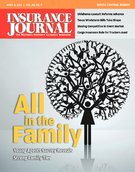Federal safety officials have stopped recommending removal of all electrical wiring in homes with problem drywall, a change in the safety protocol that could reduce the cost of remediation for many homes.
The U.S. Consumer Product Safety Commission (CPSC) and the U.S. Department of Housing and Urban Development (HUD) issued an updated remediation protocol for homes with problem drywall after a new study found no evidence of a safety hazard to home electrical systems.
Last spring, federal safety officials advised homeowners with problem drywall made in China to completely remove the tainted product and replace all electrical components and wiring, gas service piping, fire suppression sprinkler systems, smoke alarms and carbon monoxide alarms.
The latest study, conducted on behalf of CPSC by Sandia National Laboratories in New Mexico, simulated long-term exposure of wiring and other electrical components to hydrogen sulfide gas, which is associated with problem drywall. After simulating more than 40 years of corrosive conditions that could exist in problem drywall homes, Sandia staff did not observe any acute or long-term electrical safety events, such as smoking or fire. Corrosion and blackening of the exposed electrical components did occur and was observed to be consistent with the characteristic corrosion reported to CPSC by thousands of consumers.
Based on this study, federal officials have concluded that long-term exposure of wiring and other electrical components to hydrogen sulfide gases does not indicate a safety hazard to a home’s electrical systems.
With this change, the remediation guidance for homes with problem drywall still calls for the replacement of all:
- problem drywall;
- fire safety alarm devices, including smokeand carbon monoxide alarms;
- electrical distribution components, including receptacles, switches and circuit breakers; and
- gas service piping and fire suppression sprinkler systems.
Officials also issued a bulletin that broadens the range of installation years of affected homes to include homes where drywall was installed as late as 2009. The drywall installed in 2009 had been previously imported during the years 2006-2007 and does not represent any new importation of problem drywall.
Topics Homeowners
Was this article valuable?
Here are more articles you may enjoy.


 Uber Jury Awards $8.5 Million Damages in Sexual Assault Case
Uber Jury Awards $8.5 Million Damages in Sexual Assault Case  Maine Plane Crash Victims Worked for Luxury Travel Startup Led by Texas Lawyer
Maine Plane Crash Victims Worked for Luxury Travel Startup Led by Texas Lawyer  Nine-Month 2025 Results Show P/C Underwriting Gain Skyrocketed
Nine-Month 2025 Results Show P/C Underwriting Gain Skyrocketed  US Appeals Court Rejects Challenge to Trump’s Efforts to Ban DEI
US Appeals Court Rejects Challenge to Trump’s Efforts to Ban DEI 


